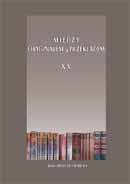Obcość w przewodnikach: między praktycznością a egzotyką
Strangeness in the guidebooks: between practicality and exotic
Author(s): Elżbieta GajewskaSubject(s): Literary Texts
Published by: KSIĘGARNIA AKADEMICKA Sp. z o.o.
Summary/Abstract: Almost all contemporary guide books contain useful words and phrases (including short dialogues), whose aim is to assist the traveler on his journey and to make it possible for him to communicate with the locals once he has reached the destination. A given sentence in one’s mother tongue is paired with its equivalent in a given foreign language. The exact choice of words is dictated by the practical circumstances of a given situation. If there is no immediate context, the guidebooks usually provide all possible translations, eg. “Czy mogę ci/Panu/Pani/wam pomóc?” for “May I help you?”, while culinary terminology is usually explained by means of descriptions. The analysis of international guidebook series clearly demonstrates that some translations were done through a third language, eg. an English-French phrasebook in a French guidebook written in English becomes the basis for a Polish-to-French translation, while the translator does not know the native language of the country (in this case French). This ‘passage’ through the English second person singular ‘you’ can result in the sentences losing some of their possible connotations, or can even distort the meaning of the utterance. However the translators are not always guided by purely practical considerations. Since every journey helps to discover a new world, they are often tempted to literally translate poetic phrases and culture-bound pleasantries in an attempt to convey at least some flavour of the exoticism of those linguistically distant languages.
Journal: Między Oryginałem a Przekładem
- Issue Year: 2009
- Issue No: 15
- Page Range: 193-209
- Page Count: 17
- Language: Polish

